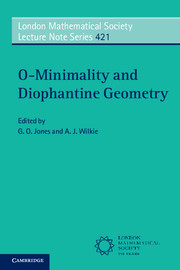Book contents
- Frontmatter
- Contents
- Preface
- 1 The Manin-Mumford Conjecture, an elliptic Curve, its Torsion Points & their Galois Orbits
- 2 Rational points on definable sets
- 3 Functional transcendence via o-minimality
- 4 Introduction to abelian varieties and the Ax–Lindemann–Weierstrass theorem
- 5 The André-Oort conjecture via o-minimality
- 6 Lectures on elimination theory for semialgebraic and subanalytic sets
- 7 Relative Manin-Mumford for abelian varieties
- 8 Improving the bound in the Pila-Wilkie theorem for curves
- 9 Ax-Schanuel and o-minimality
Preface
Published online by Cambridge University Press: 05 August 2015
- Frontmatter
- Contents
- Preface
- 1 The Manin-Mumford Conjecture, an elliptic Curve, its Torsion Points & their Galois Orbits
- 2 Rational points on definable sets
- 3 Functional transcendence via o-minimality
- 4 Introduction to abelian varieties and the Ax–Lindemann–Weierstrass theorem
- 5 The André-Oort conjecture via o-minimality
- 6 Lectures on elimination theory for semialgebraic and subanalytic sets
- 7 Relative Manin-Mumford for abelian varieties
- 8 Improving the bound in the Pila-Wilkie theorem for curves
- 9 Ax-Schanuel and o-minimality
Summary
In July 2013 an LMS-EPSRC Short Instructional Course on ‘O-minimality and diophantine geometry’ was held in the School of Mathematics at the University of Manchester. This volume consists of lecture notes from the courses together with several other surveys. The motivation behind the short course was to introduce participants to some of the ideas behind Pila's recent proof of the André-Oort conjecture for products of modular curves. The underlying ideas are similar to an earlier proof by Pila and Zannier of the Manin-Mumford conjecture (which has in fact long been a theorem, originally due to Raynaud) and combining the results of the various contributions here leads to a proof of this conjecture in certain cases. The basic strategy has three main ingredients: the Pila-Wilkie theorem, bounds on Galois orbits, and functional transcendence results. Each of the topics was the focus of a course. Wilkie discussed o-minimality and the Pila-Wilkie theorem without assuming any background in mathematical logic. (The argument given here is, in fact, slightly different from that given in the original paper, at least in the one-dimensional case.) Habegger's course focused on the Galois bounds and on the completion of the proof (of certain cases of Manin-Mumford) from the various ingredients. And Pila's lectures covered functional transcendence, also touching on various recent related work by Zilber.We have also included some further lecture notes by Wilkie containing a proof of the o-minimality of the expansion of the real field by restricted analytic functions, which is sufficient for the application of Pila-Wilkie to Manin-Mumford. At the short course there were also three guest lectures. Yafaev spoke on very recent breakthroughs on the functional transcendence side in the setting of general Shimura varieties. Masser spoke on some other results (‘relative Manin-Mumford’) that can be obtained by a similar strategy. Jones discussed improvements to the Pila-Wilkie theorem. Unfortunately, Yafaev was unable to contribute to this volume. During the week of the course, tutorials were given by Daw and Orr. For this volume, Orr has written a survey of abelian varieties which contains a proof of the functional transcendence result necessary for the application in Habegger's course.
Information
- Type
- Chapter
- Information
- O-Minimality and Diophantine Geometry , pp. xi - xiiPublisher: Cambridge University PressPrint publication year: 2015
